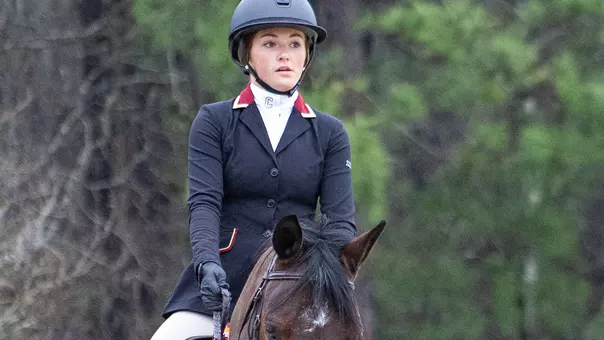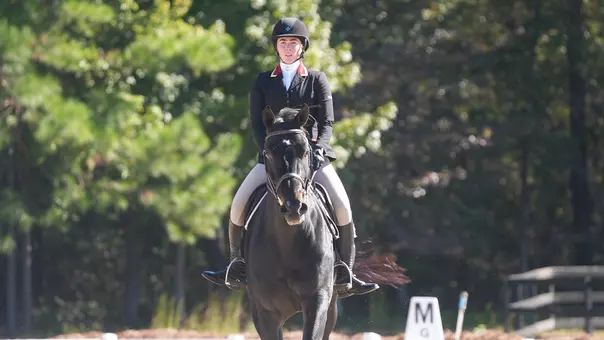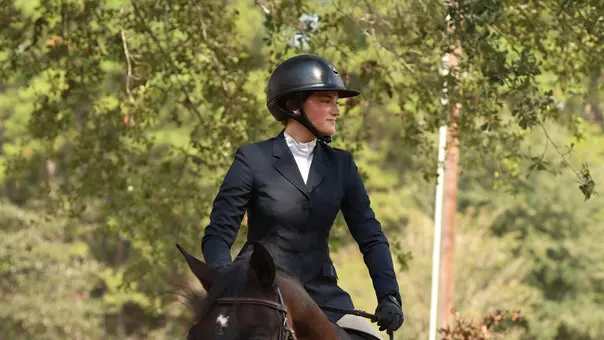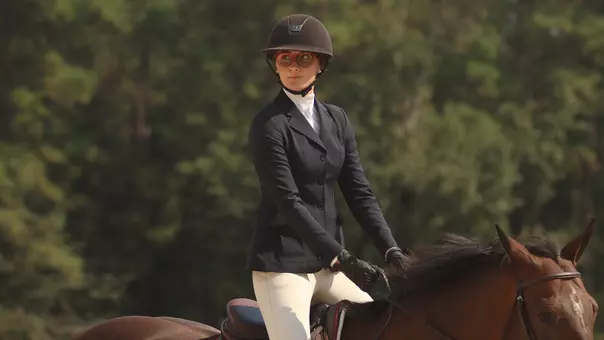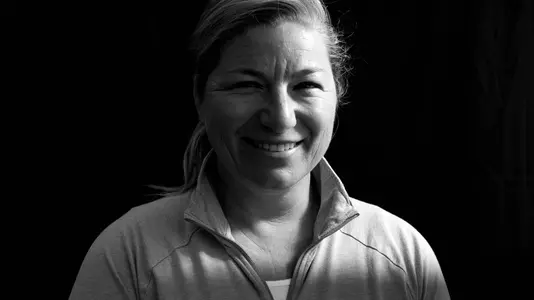
Year Of Women Coach Series: Natasha V. McCarthy
5/30/2019 10:30:00 AM | Equestrian
Photo Credits: Marquise Pointer / Athletics Communications Student Intern
NICK VLATTAS
CofCSports.com
For College of Charleston equestrian head coach Natasha V. McCarthy, hard work and horses is all she's ever known.
As a self-proclaimed "barn rat," McCarthy's early years were spent with her older sister (Alexandra Zulia) at a local barn in Washington, D.C. From dawn to dusk, they would muck stalls, groom horses and perform any other odd job the barn owners needed done.
"Out of all the sports and after school activities our mom (Patricia Vitkovic) exposed us to, it was the horses that continually called our name," McCarthy said. "But, as she was a single parent, we had to work off our lessons and show fees, since she didn't have the money to keep us both riding year-round."
On her way to work, McCarthy's mother would drop the two off with a bag lunch and pick them up after work. It became a way of life very early on.
As a busy working professional in the hotel industry, it also meant working on-duty over the weekends, which was fine by McCarthy – Saturdays and Sundays were now being spent with the horses learning and making friends with other like-minded horse crazy kids.
The sisters would work for three-or-four hours in order to earn a 30-minute lesson or riding window and they didn't know any other way. It instilled a sense of responsibility in McCarthy and an appreciation for the fact that opportunities must be earned.
Her riding abilities blossomed. She enjoyed a decorated junior riding career, which included qualifying for the National Finals.
 College wasn't always on her radar, but she saw the value of education and staved off her desire to turn professional—like many of her peers did around the age of 18—and instead enrolled at the only college she applied to, Hollins University (then Hollins College) in Roanoke, Virginia.
College wasn't always on her radar, but she saw the value of education and staved off her desire to turn professional—like many of her peers did around the age of 18—and instead enrolled at the only college she applied to, Hollins University (then Hollins College) in Roanoke, Virginia.
After graduating from Hollins in 2000, she spent the next seven years working with some of the nation's most esteemed professionals, maintaining and showing horses competitively from Florida to Vermont.
Despite her talents, McCarthy still had to apply herself to get access to horses and hone her skills—which is not an inexpensive thing to do. Throughout her burgeoning riding career, she maintained a rigid commitment to hard work and willingness to sacrifice in order to be around what she loved.
"My sister and I would purchase horses with what money we could spare and then train them to be more desirable, competition-worthy horses and sell them for a profit," she said. "We were from a hard-working background that maintained a high standard for ourselves.
"Many people assume that if you're in this profession, you come from a horse background or have a parent who rode professionally. When really, it's a lot more like the hotel industry—which I am a product of. It's a lot like running a bed and breakfast for these horses. Housekeeping is every day. They're there 24 hours a day, seven days a week, 365 days a year. It doesn't matter if it's a holiday, a hurricane, snowing or 120 degrees out. It challenges your commitment to the sport when you're responsible for the welfare of living animals."
In 2007, she accepted a position at Tuxbury Farm in Charleston, S.C., actualizing her dream to become an equestrian professional. She began as a substitute lesson instructor, but almost immediately started assuming more and more responsibility until she ran the entire operation.
McCarthy oversaw the farm for eight years, spearheading all of its moving parts such as overseeing summer riding programs, buying and selling horses, establishing lesson programs, managing employees and upkeeping the farm itself. It was a 365-day-per-year job, but that's all she'd known since she was a little girl.
That experience prepared McCarthy for her next step in the industry: purchasing the 24-acre, 24-stall boarding facility now known as White Horses, LLC.
McCarthy credits her preparedness back to her childhood, but also her impactful decision to enroll at Hollins.
"I've always been very thankful that I elected to go to college and even more thankful that I graduated with a goal," she said. "It's helped me in so many ways, like acquiring a business loan, maintaining a business plan, budgeting and managing employees. My service and expertise may be horses, but I have to be an even better coach and business owner."
Through her experience at both Tuxbury and White Horses, McCarthy has shaped many prestigious riding clients, and in many ways has evolved the perception of the Charleston area on the national equestrian stage.
As such, it's no wonder that when the College of Charleston needed a new equestrian coach, they didn't have to look beyond their own back yard.
Adding to her responsibilities involved in running White Horses, she now oversees the maintenance of 12 additional horses, which are under the care of CofC, in addition to the 36 student-athletes who make up the equestrian roster.
The transition to collegiate coaching has come with its growing pains, but McCarthy's experience has her up to the task.
She immediately recognized the inherent challenge in scouting other teams and learning the riding styles of the other collegiate coaches—many of whom have been in their roles for decades. Coming from the private sector, McCarthy quickly had to learn to adapt.
Another inherent challenge has been working with student-athletes in a collegiate setting, which entails more group training as opposed to one-on-one lessons. She smoothed that transition in the early going by being observant and avoiding being too assertive, while yet remaining a leader.
As soon as she took the helm, McCarthy held an open tryout for every spot on the roster—including those previously belonging to the returning upperclassmen.
 By doing so, she was setting a precedent that everything had to be earned and no one was entitled to anything.
By doing so, she was setting a precedent that everything had to be earned and no one was entitled to anything.
"Of course, I wanted to see a great, natural riding style," McCarthy said. "But, I really asked a lot of questions to get a sense of their personality and work ethic. I didn't want to cultivate an atmosphere with any self-entitlement. Horses don't know what you've accomplished or where you've come from. They only know the respect you show them in the present."
McCarthy believes these ideals are what shape not only great riders, but also great leaders—fit to succeed at life beyond The College.
"The way I run my business, and the way I run this program, is the same way I treat horses," she concluded. "Horses can teach you hard lessons about life. They teach you humility and train you to accept you're not always in full control. They teach you perseverance and overcoming fear or self-doubt. They teach the values of work ethic and accountability. Horses haven't changed much with the times—they don't care about traffic or social media, or anything going on in your life. They require time, structure and precision—the more you can be consistent, the more you'll thrive on a horse.
"If young riders or collegiate riders can absorb that, I know they'll be employable and successful. That's what it's about for me. Winning is great, but accountability is what riding imparts."
Editor's Note: The College of Charleston celebrated the 2018-19 academic year as the "Year of Women." Throughout the year, CofC hosted a series of events, speakers, seminars, and more to commemorate this anniversary. The events were designed to encourage dialogue about the admission and history of women students at The College, and to highlight their many contributions over the last 100 years. In conjunction, College of Charleston Athletics profiled its female head coaches: Amy Seago (women's track and field/cross country), Linda Kalafatis (softball) and Natasha V. McCarthy (equestrian). The series chronicled the triumphs they've earned and the obstacles they've overcome, and provided a glimpse into how they continue to enable young women and shape the career paths of their student-athletes, on-and-off the fields and courts.
NICK VLATTAS
CofCSports.com
For College of Charleston equestrian head coach Natasha V. McCarthy, hard work and horses is all she's ever known.

As a self-proclaimed "barn rat," McCarthy's early years were spent with her older sister (Alexandra Zulia) at a local barn in Washington, D.C. From dawn to dusk, they would muck stalls, groom horses and perform any other odd job the barn owners needed done.
"Out of all the sports and after school activities our mom (Patricia Vitkovic) exposed us to, it was the horses that continually called our name," McCarthy said. "But, as she was a single parent, we had to work off our lessons and show fees, since she didn't have the money to keep us both riding year-round."
On her way to work, McCarthy's mother would drop the two off with a bag lunch and pick them up after work. It became a way of life very early on.
As a busy working professional in the hotel industry, it also meant working on-duty over the weekends, which was fine by McCarthy – Saturdays and Sundays were now being spent with the horses learning and making friends with other like-minded horse crazy kids.
The sisters would work for three-or-four hours in order to earn a 30-minute lesson or riding window and they didn't know any other way. It instilled a sense of responsibility in McCarthy and an appreciation for the fact that opportunities must be earned.
Her riding abilities blossomed. She enjoyed a decorated junior riding career, which included qualifying for the National Finals.
 College wasn't always on her radar, but she saw the value of education and staved off her desire to turn professional—like many of her peers did around the age of 18—and instead enrolled at the only college she applied to, Hollins University (then Hollins College) in Roanoke, Virginia.
College wasn't always on her radar, but she saw the value of education and staved off her desire to turn professional—like many of her peers did around the age of 18—and instead enrolled at the only college she applied to, Hollins University (then Hollins College) in Roanoke, Virginia.After graduating from Hollins in 2000, she spent the next seven years working with some of the nation's most esteemed professionals, maintaining and showing horses competitively from Florida to Vermont.
Despite her talents, McCarthy still had to apply herself to get access to horses and hone her skills—which is not an inexpensive thing to do. Throughout her burgeoning riding career, she maintained a rigid commitment to hard work and willingness to sacrifice in order to be around what she loved.
"My sister and I would purchase horses with what money we could spare and then train them to be more desirable, competition-worthy horses and sell them for a profit," she said. "We were from a hard-working background that maintained a high standard for ourselves.
"Many people assume that if you're in this profession, you come from a horse background or have a parent who rode professionally. When really, it's a lot more like the hotel industry—which I am a product of. It's a lot like running a bed and breakfast for these horses. Housekeeping is every day. They're there 24 hours a day, seven days a week, 365 days a year. It doesn't matter if it's a holiday, a hurricane, snowing or 120 degrees out. It challenges your commitment to the sport when you're responsible for the welfare of living animals."
In 2007, she accepted a position at Tuxbury Farm in Charleston, S.C., actualizing her dream to become an equestrian professional. She began as a substitute lesson instructor, but almost immediately started assuming more and more responsibility until she ran the entire operation.
McCarthy oversaw the farm for eight years, spearheading all of its moving parts such as overseeing summer riding programs, buying and selling horses, establishing lesson programs, managing employees and upkeeping the farm itself. It was a 365-day-per-year job, but that's all she'd known since she was a little girl.
That experience prepared McCarthy for her next step in the industry: purchasing the 24-acre, 24-stall boarding facility now known as White Horses, LLC.
McCarthy credits her preparedness back to her childhood, but also her impactful decision to enroll at Hollins.

"I've always been very thankful that I elected to go to college and even more thankful that I graduated with a goal," she said. "It's helped me in so many ways, like acquiring a business loan, maintaining a business plan, budgeting and managing employees. My service and expertise may be horses, but I have to be an even better coach and business owner."
Through her experience at both Tuxbury and White Horses, McCarthy has shaped many prestigious riding clients, and in many ways has evolved the perception of the Charleston area on the national equestrian stage.
As such, it's no wonder that when the College of Charleston needed a new equestrian coach, they didn't have to look beyond their own back yard.
Adding to her responsibilities involved in running White Horses, she now oversees the maintenance of 12 additional horses, which are under the care of CofC, in addition to the 36 student-athletes who make up the equestrian roster.
The transition to collegiate coaching has come with its growing pains, but McCarthy's experience has her up to the task.
She immediately recognized the inherent challenge in scouting other teams and learning the riding styles of the other collegiate coaches—many of whom have been in their roles for decades. Coming from the private sector, McCarthy quickly had to learn to adapt.
Another inherent challenge has been working with student-athletes in a collegiate setting, which entails more group training as opposed to one-on-one lessons. She smoothed that transition in the early going by being observant and avoiding being too assertive, while yet remaining a leader.
As soon as she took the helm, McCarthy held an open tryout for every spot on the roster—including those previously belonging to the returning upperclassmen.
 By doing so, she was setting a precedent that everything had to be earned and no one was entitled to anything.
By doing so, she was setting a precedent that everything had to be earned and no one was entitled to anything."Of course, I wanted to see a great, natural riding style," McCarthy said. "But, I really asked a lot of questions to get a sense of their personality and work ethic. I didn't want to cultivate an atmosphere with any self-entitlement. Horses don't know what you've accomplished or where you've come from. They only know the respect you show them in the present."
McCarthy believes these ideals are what shape not only great riders, but also great leaders—fit to succeed at life beyond The College.
"The way I run my business, and the way I run this program, is the same way I treat horses," she concluded. "Horses can teach you hard lessons about life. They teach you humility and train you to accept you're not always in full control. They teach you perseverance and overcoming fear or self-doubt. They teach the values of work ethic and accountability. Horses haven't changed much with the times—they don't care about traffic or social media, or anything going on in your life. They require time, structure and precision—the more you can be consistent, the more you'll thrive on a horse.
"If young riders or collegiate riders can absorb that, I know they'll be employable and successful. That's what it's about for me. Winning is great, but accountability is what riding imparts."
Editor's Note: The College of Charleston celebrated the 2018-19 academic year as the "Year of Women." Throughout the year, CofC hosted a series of events, speakers, seminars, and more to commemorate this anniversary. The events were designed to encourage dialogue about the admission and history of women students at The College, and to highlight their many contributions over the last 100 years. In conjunction, College of Charleston Athletics profiled its female head coaches: Amy Seago (women's track and field/cross country), Linda Kalafatis (softball) and Natasha V. McCarthy (equestrian). The series chronicled the triumphs they've earned and the obstacles they've overcome, and provided a glimpse into how they continue to enable young women and shape the career paths of their student-athletes, on-and-off the fields and courts.
Charleston Women's Basketball Post Game Press Conference vs. Campbell (3/1/26)
Sunday, March 01
On the Prowl with Charleston Athletics: Anilys Rolon, Women's Basketball
Wednesday, February 25
Cougars Uncaged Episode 6: Ryley Kutter
Monday, February 23
Charleston Men's Basketball Post Game Press Conference vs. Monmouth (2/21/26)
Saturday, February 21
